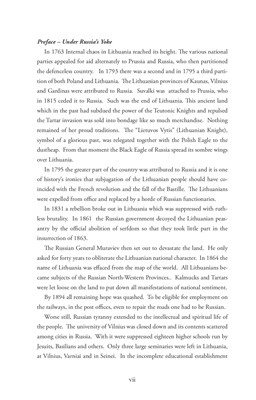
vii
Preface - Under Russia's Yoke
In 1763 Internal chaos in Lithuania reached its height. The various national
parties appealed for aid alternately to Prussia and Russia, who then partitioned
the defenceless country. In 1793 there was a second and in 1795 a third partition of
both Poland and Lithuania. The Lithuanian provinces of Kaunas, Vilnius
and Gardinas were attributed to Russia. Suvalki was attached to Prussia, who
in 1815 ceded it to Russia. Such was the end of Lithuania. This ancient land
which in the past had subdued the power of the Teutonic Knights and repulsed
the Tartar invasion was sold into bondage like so much merchandise. Nothing
remained of her proud traditions. The "Lietuvos Vytis" (Lithuanian Knight),
symbol of a glorious past, was relegated together with the Polish Eagle to the
dustheap. From that moment the Black Eagle of Russia spread its sombre wings
over Lithuania.
In 1795 the greater part of the country was attributed to Russia and it is one
of history's ironies that subjugation of the Lithuanian people should have coincided with
the French revolution and the fall of the Bastille. The Lithuanians
were expelled from office and replaced by a horde of Russian functionaries.
In 1831 a rebellion broke out in Lithuania which was suppressed with ruthless brutality.
In 1861 the Russian government decoyed the Lithuanian peasantry
by the official abolition of serfdom so that they took little part in the
insurrection of 1863.
The Russian General Muraviev then set out to devastate the land. He only
asked for forty years to obliterate the Lithuanian national character. In 1864 the
name of Lithuania was effaced from the map of the world. All Lithuanians became subjects
of the Russian North-Western Provinces.. Kalmucks and Tartars
were let loose on the land to put down all manifestations of national sentiment.
By 1894 all remaining hope was quashed. To be eligible for employment on
the railways, in the post offices, even to repair the roads one had to be Russian.
Worse still, Russian tyranny extended to the intellectual and spiritual life of
the people. The university of Vilnius was closed down and its contents scattered
among cities in Russia. With it were suppressed eighteen higher schools run by
Jesuits, Basilians and others. Only three large seminaries were left in Lithuania,
at Vilnius, Varniai and in Seinei. In the incomplete educational establishment